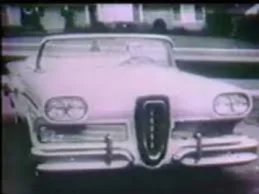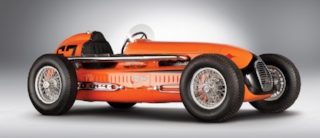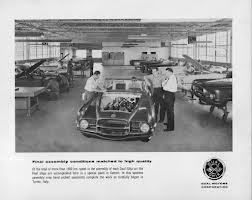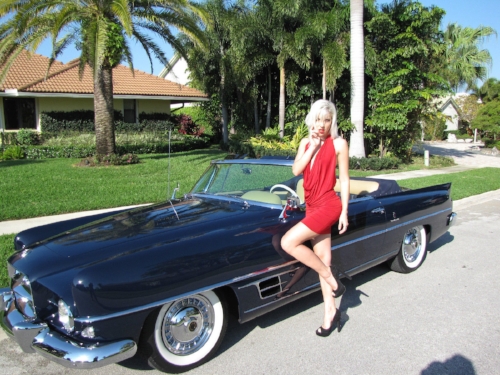Dreams Do Come True: The Dual-Ghia
/Ah, those glorious dream cars. Every big auto show features some. They rotate on their elevated stands, seductively draped in a glamorous model who enthusiastically rattles off feature after amazing feature. How often have we dreamed of ourselves behind the wheel of one of those rolling sculptures, maybe that glamourous model by our side, as we cruise the boulevard. Isn’t that why they call them dream cars?
But how many of these dreams actually came true? Even if that beauty gets the go ahead for production, only a few of her amazing features make the cut. Maybe that cool grill stays, but those hand shaped lusciously curved fenders? Victims to the cruel realities of mass production. One dream did come true, however. In the end it was not a profitable dream, but it was a most delicious one.
The Dream Cars of Virgil Exner
Starting in 1950, Chrysler Corporation’s Design Chief, Virgil M. Exner, penned a series of voluptuous rolling sculptures that sought to banish from public awareness his the car makers’s lackluster offerings of the recent past. He and his team of designers created more than two dozen “Idea Cars” that explored 4 or 5 evolving design themes. Nearly all of them were built by Carrozzeria Ghia in Turin, Italy.
Virgil Exner (www.wikicars.com)
The 1953 Dodge Fire Arrow was the first of the second generation of Idea Car themes. Like the others, the Fire Arrow had a chassis and drivetrain from one of the Chrysler divisions. In this case, a Dodge Coronet.
Dodge Fire Arrow (www.Coachbuilt.com)
The Fire Arrow was a sensation on the show circuit. But Exner could not make a sufficient business case to convince Chrysler to put it into production.
Dodge Fire Arrow (www.CarBase.com)
Eugene Cassaroll: A Man with a Dream
Eugene Cassaroll, owner of Detroit based Auto Shippers, Inc, saw the Fire Arrow while touring the 1953 New York Auto Show. He was so taken with this beauty that he set about acquiring from Chrysler the rights to its design. He contracted with Ghia Carrozzeira, who was all too happy to produce the car in numbers greater than one. Chrysler components would be used – including the 230hp polyspheric head V8 from Dodge’s new factory muscle car the D-500.
Thus, Mr. Cassaroll launched himself down the expensive and heart breaking path so many other wealthy men have travelled in order to see their names spelled out in chrome.
How Cassaroll got his dough (www.Pinterest.com)
Cassaroll not only hauled cars, he raced them, too. One of the most successful was the Auto Shippers sponsored Snowberger-Offy 1949 Indy car.(www.RMSouthbys.com)
Cassaroll also owned another business, one that made tank haulers for the military. These beasts were propelled by a front and a rear motor, and thus his company was called Dual Motors. The partnership for Dual Motors and the Ghia studios lead to the mildly curious hyphenated moniker, Dual-Ghia
Designs, chassis, engines, the only thing Chrysler wouldn’t sell to Cassaroll was the right to the Fire Arrow name. Thus Dual-Ghia’s first prototype was called, for some unexplained reason, the Firebomb. The car stayed true to the original concept, but the name had to go.
Dual-Ghia Firebomb (www.Flickriver.com)
The Dual Ghia’s rolling chassis were produced by Dodge in Detroit and shipped to Turin, Italy. There they were finished with bodies and interiors made by Ghia craftsmen and then then sent back to Detroit to have drivelines and electricals installed. This made for the world’s longest assembly line.
Dual-Ghias under constructions (www.CarStyling.RU
The First Dual-Ghia
Of the 99 production Dual-Ghias built from 1956-1958, many found their way into the driveways of the famous and the powerful. President Dwight D Eisenhower and the Shah of Iran each had one. So did entertainers Debbie Reynolds, Eddie Fisher and Peter Lawford. Lucille Ball and Desi Arnez had his & her Dual-Ghias (dual Duals?) His Dual-Ghia (or was it hers) was apparently a major bone of contention in their divorce settlement. Ronald Reagan also had a Dual-Ghia when he was governor of California. But legend has it, in those days when Rs and Ds actually talked to each other, the Gipper lost his car in a high stakes poker game to president Lyndon Johnson.
1957 Dual-Ghia (www.EBay.com)
Ol’ Blue Eyes had a Dual-Ghia, and so did most of his infamous “Rat Pack.” All except Dean Martin, who for reasons unclear, was turned away. Dino ended up getting a Ghia-designed Facel Vega instead.
(www.MynTransportBlog.com)
Dual-Ghia’s connection to Hollywood, if not Washington, endured. This one had a roll in 1987’s Beverley Hills Cop II. It was not likely wearing a factory paint job.
(www.IMCDB.com)
The Dual-Ghia carried a $7650 price tag when it was new. At the time only Rolls Royce, the Cunningham C-3, the Continental Mark II, and the Cadillac El Dorado Biarritz cost more. Despite its stratospheric price tag, it was estimated that Eugene Cassaroll lost $2000 on each car he produced. Eugene was rich but not that rich. Sadly, at the end of 1958, Dual-Ghia became a make that didn’t make it. Today, an original Dual-Ghia can bang the auction gavel at close to half a million dollars.
1958 Dual-Ghia (RMAuctions.com)
The Second Coming of Dual Ghia
With Eugene Cassaroll’s withdrawal from the operation, Dual-Ghia’s hyphen of a partnership is dissolved. Ghia Design decided to go it alone. For continuity’s sake they kept Dual in the name, but the car was all new. The second generation model was more of a European GT than American boulevard cruiser. The redesigned 1961 Dual Ghia 6.4L still used a Chrysler-built V-8 under its hood, but it was now cradled in an Italian-built aluminum space frame.
1961 Dual Ghia 6.4L
The price tag on the Dual Ghia 6.4L was about double that of the previous car. The plan was for Ghia to craft 50 of them over 2 years. In fact, they made only 26 from 1961-1964...
1963 Dual Ghia 6.4L (www.BringaTrailer.com)
…at least in 1:1 scale. Many thousands of substantially smaller, cheaper and more profitable Dual Ghias were sold by Corgi Toys of Great Britain.
Dual Ghia by Corgi Toys (www.Modelly.com)
Big or small, this lovely coupe was seared into the consciousness of car collectors, past, present and future.
A Dual Ghia 6.4L on the storied lawn of the Pebble Beach Concours D’Elegance (2014)
Copyright@2018 by Mal Pearson
















